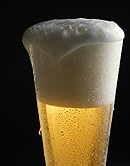
THURSDAY, July 15 (HealthDay News) — For an hour after drinking even a small amount of alcohol, the risk of stroke increases, a small, preliminary study suggests.
But even though your risk may rise over that short time, the researchers noted that moderate drinking over the long-term might actually reduce your risk of heart attack and stroke.
“The risk of ischemic stroke may be transiently elevated in the two hours after drinking as little as one serving of beer, wine, or liquor,” said lead researcher Elizabeth Mostofsky, a member of the Cardiovascular Epidemiology Research Unit at Beth Israel Deaconess Medical Center in Boston.
However, conclusive evidence about the association between alcohol consumption and the acute risk of stroke would require a long-term clinical trial, she added.
“Nonetheless, these results suggest that there is an acute elevated risk of ischemic stroke that may be offset by the potential beneficial effects of long-term moderate alcohol consumption,” Mostofsky said. But the findings may not apply to patients with severe stroke, she added.
For the study, published in the July 15 online edition of Stroke, Mostofsky’s group interviewed 390 patients about three days after their stroke. Patients who could not speak or were too ill were excluded from the study.
In all, 14 patients had been drinking in the hour before their stroke, the researchers found.
“We found that compared with times when alcohol was not consumed, the relative risk of stroke after alcohol consumption was 2.3 times higher in the hour after drinking beer, wine or liquor,” Mostofsky said.
“The relative risk was 1.6 in the second hour after drinking. By 24 hours, there was a 30 percent lower risk,” she said.
This pattern remained regardless of the type of alcohol consumed or whether the patients had exercised before their stroke. Moreover, when the researchers excluded the one patient who had had more than two drinks, the pattern continued.
This finding may be due to the immediate effects of alcohol, which increases blood pressure and causes blood platelets to become stickier, perhaps increasing the risk of clotting, the authors noted.
But drinking small amounts of alcohol over time appears to have a beneficial effect on blood fats and may make blood vessels more flexible, which might reduce the risk of heart attack and stroke, the researchers said.
Stroke is the third-leading killer and a major cause of long-term major disability in the United States, according to the American Heart Association.
Dr. Larry B. Goldstein, a professor of neurology and director of the Duke Stroke Center at Duke University Medical Center and a spokesman for the American Heart Association/American Stroke Association, said that “current guidelines indicate that for people who drink, men should consume no more than two alcoholic beverages per day and women no more than one, and women should abstain during pregnancy.”
Evidence suggests that light to moderate alcohol consumption in this range is associated with a reduction in stroke risk, but heavier drinking is associated with an increase in stroke risk, he said.
“This new research suggests that the risk of stroke may be transiently increased in the first hour after drinking even small amounts of alcohol. But, the numbers of patients were too small to determine whether this risk varied depending on the type of alcohol consumed,” Goldstein said.
The findings should not necessarily deter moderate drinking, he added.
“For those who consume alcohol, this transient increase in risk needs to be balanced against the potential long-term reduction in risk with mild-moderate consumption,” he said.
More information
For more information on stroke, visit the U.S. National Library of Medicine.

